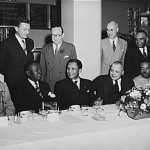May Jurors Twitter?
From Scientific American:
Avid tweeter Jonhathan Powell of Fayetteville, Ark., will have his name in the New York Times tomorrow. How do we know this? From his Twitter feed, of course. That would be the same feed he used last month to tweet about a trial while a member of the jury, which pleased his Twitter fans but prompted the defense attorney in the case to seek a new trial. On what grounds? That Powell’s tweets allegedly showed he was biased against defendant Russell Wright (and his company Stoam Holdings, a building materials company in Fayetteville, Ark.), who was found guilty of mismanaging investors’ funds, The Morning News reports. The jury awarded investors who sued Stoam $12.6 million.
The article mentions another, similar case. I will confess that this tweeting/twittering business is one technology I haven’t gotten involved in at all, so I don’t fully understand how it works. I take it, though, that the twitterer (tweeter? twit?) posts statements for others to read. For instance, Mr. Powell posted about his experience as a juror, while he was still a juror.
To me, it seems unwise to permit jurors to twitter during the time when they are performing their duties. Just as it would seem unwise to permit jurors to write a column in the morning edition of the newspaper about how things were going on the jury.
Updated: It turns out that John McCain also twitters. Perhaps I should try it. In the summer.

 On March 2, the Wisconsin Supreme Court accepted six new cases for review, five criminal cases and one civil case.
On March 2, the Wisconsin Supreme Court accepted six new cases for review, five criminal cases and one civil case.